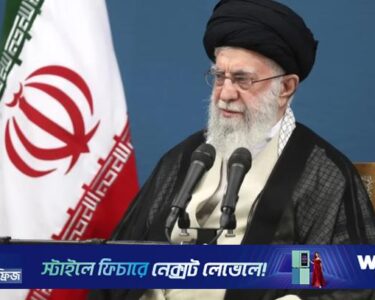Today, May 3, is World Free Press Day. In accordance with the recommendation of the 26th General Session of UNESCO in 1991, the United Nations General Assembly recognized May 3 as World Press Freedom Day in 1993.
This year the theme of the day is 'ism in the face of environmental crisis'. Like other countries of the world, the day is celebrated through various programs in Bangladesh. On the occasion of World Free Media Day, journalists of the country hold various programs to establish their professional rights and dignity.
Newspapers are the oldest and most important media in the world. Later, radio and television were added as popular media. In the age of modern information technology, online news portals have created a strong position among readers.
Generally speaking, free media means that journalists will not be subjected to any form of harassment or violence in the performance of their professional duties. They can work without fear. Also they will have free access to information.
The Universal Declaration of Human Rights adopted by the United Nations General Assembly in 1948 recognized the importance of freedom of expression and the press. Article 19 of the Declaration states, 'Everyone has freedom of opinion and expression; This includes the right to freely hold opinions without interference and to seek, receive and impart information and ideas through any media, regardless of national frontiers.'
The constitution of Bangladesh also guarantees freedom of thought and conscience and freedom of speech. Article 39 of the Constitution entitled 'Freedom of Thought and Conscience and Freedom of Speech' states (1) Freedom of thought and conscience is guaranteed. (2) subject to reasonable restrictions imposed by law in the interests of national security, friendly relations with foreign states, public order, decency and morals or in contempt of court, libel or incitement to crime- (a) the right of every citizen to freedom of speech and expression and ( b) Freedom of press was guaranteed.
Newspaper or mass media is called as the fourth pillar of a state. Therefore, one of the prerequisites for the establishment of democracy in a country is to ensure freedom of expression. It also plays a key role in establishing good governance.
It is the responsibility of the government to ensure that journalists can perform their duties properly in a safe and unhindered environment so that the media can stand on a solid foundation as the fourth pillar of the state. And without the true freedom of journalists, free media is far defeated.
ists in almost all countries of the world are more or less intimidated just for carrying out their professional duties. Bangladesh is no exception. Independent journalism has to face obstacles in many cases due to pressure from influential circles, attacks-cases, political threats. Government officials at the field level do not go short in this regard. Whenever they get a chance, they harass journalists in various ways and even misuse digital security law or mobile courts against journalists. However, there is no alternative for journalists to play their role independently to successfully implement the 'Transition of Digital Bangladesh to Smart Bangladesh' program announced by the current government.
Because mass media creates awareness among individuals. The role of media in shaping public opinion by providing information is undeniable. It also ensures accountability by pointing out the mistakes and errors of the government through constructive criticism and increasing transparency. Apart from this, free media is also vital for human rights and social justice. Therefore, by ensuring the freedom of the media, the strong trend of development and development of the society is established.
Newspapers are called the mirror of society. Newspapers don't just deliver news. It also plays a special role in the overall development of the society. Newspapers are the ever-vigilant guardians of democracy. When human rights are violated, when democracy is disrupted, when there is corruption somewhere, the media becomes the first to speak out. The role of newspapers in advancing the society towards positive development by creating awareness against various social ills like superstition and superstition is undeniable.
However, in the performance of professional duties, journalists must remember that there is a limit to freedom. Freedom does not mean doing or writing whatever you want. ists are not above responsibility. To the country, to the society, to the law, to their own conscience, to ethics, they must have responsibility. They will live up to this responsibility by following journalistic principles of objective writing and presenting accurate and complete information.
The main asset of the media is its credibility, which has to be achieved through objective reporting. However, due to various reasons, the media of our country has lost its credibility. This does not bode well for the dignity of the journalism profession. So, journalists must be careful that they are not affected by yellow journalism, bad journalism or irresponsible journalism in any way.
Again, there is no way to deny this – many are using the media unethically for their own interests and turning it into a propaganda tool to attack their opponents. There are also allegations that some media outlets provide one-sided or biased news.
ists should always remember while making a report- 'A half-truth is even more dangerous than a lie. So 'Learn to write the truth not by blowing, but by burning with fire' – this immortal words of the world poet Rabindranath Tagore should be kept in their hearts.
In the current era, various social media including unregulated Facebook, YouTube and X often try to create unrest or create chaos in the society by spreading rumors or wrong information. A free media is essential to prevent all those rumours, false information and misinformation to build a strong and stable society.
ism is a great profession. It is a profession of intellect and thought, a profession of study and diligence; But there is indifference from all walks of life in improving the quality of life of people engaged in this profession and providing life security.
On the other hand, numerous journalists are being killed in various countries of the world while performing their professional duties. According to the Committee to Protect ists (CPJ), at least 99 journalists around the world died in the line of duty in 2023. 77 of them lost their lives in the Israel-Hamas war in Gaza.
Bangladesh /SS



